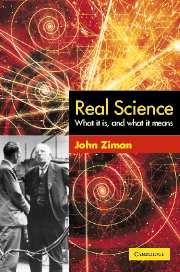Book contents
- Frontmatter
- Contents
- Preface
- 1 A peculiar institution
- 2 Basically, it's purely academic
- 3 Academic science
- 4 New modes of knowledge production
- 5 Community and communication
- 6 Universalism and unification
- 7 Disinterestedness and objectivity
- 8 Originality and novelty
- 9 Scepticism and the growth of knowledge
- 10 What, then, can we believe?
- Endnotes
- Bibliography and author index
- Index
8 - Originality and novelty
Published online by Cambridge University Press: 24 August 2009
- Frontmatter
- Contents
- Preface
- 1 A peculiar institution
- 2 Basically, it's purely academic
- 3 Academic science
- 4 New modes of knowledge production
- 5 Community and communication
- 6 Universalism and unification
- 7 Disinterestedness and objectivity
- 8 Originality and novelty
- 9 Scepticism and the growth of knowledge
- 10 What, then, can we believe?
- Endnotes
- Bibliography and author index
- Index
Summary
Problems
Academic science is energized by the norm of originality [3.6]. This norm requires scientists to produce new knowledge – that is, communally acceptable information that was not previously known. To do this, they engage in research. But they can be credited with CUDOS [3.8] only for what they discover through research that they have themselves decided to undertake. Academic science – and, in the end, cognitive change – is thus steered by innumerable independent decisions of this kind.
The significance of this process is often under-estimated. Philosophers constantly insist that scientific knowledge is provisional, but they seldom remind us that, even though it is continually expanding, it is very patchy in its coverage. This is not just a regrettable weakness, which can be forgiven because it will in due course be made good. It is a fundamental epistemic characteristic of academic science, closely connected with its social structure and cultural practices.
To put it simply: at any given moment, what we know and how well we know it depends on what our predecessors decided to study in the past. What we shall know in the foreseeable future will depend on what research we undertake now. For example, we would not nowadays be studying the medical uses of genetic information if Francis Crick and James Watson – not to mention many others – had not individually decided, nearly 50 years ago, to investigate the structure of DNA.
- Type
- Chapter
- Information
- Real ScienceWhat it Is and What it Means, pp. 182 - 245Publisher: Cambridge University PressPrint publication year: 2000
- 2
- Cited by

